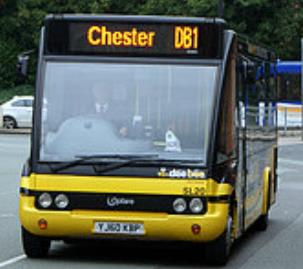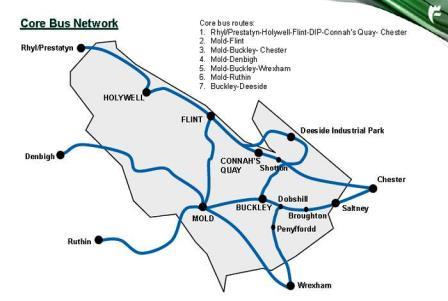 Governments across Europe are grappling with problems of austerity and this is having a particularly severe impact on local government across Britain. One of the key casualties is rural transport. Increasingly cash-strapped local authorities are finding that they can no longer subsidise bus routes that are not commercially viable. As with a number of other services and amenities, it is rural communities which have the lowest number of service users and therefore it is services in these areas which are at greatest risk. This situation has the potential to change significantly something that we have taken for granted as part of our heritage. This month’s article looks at what is being done to develop community resilience to lessen the impact of the withdrawal of bus subsidies in Flintshire. The financial outlook to 2018 shows uncertainty with regard to the future of the Welsh Government Bus Service Support Grant after 2016. All subsidies are expected to end by 2018 with serious implications for current provision. Flintshire County Council has been flagging up the issue for some time and invited elected representatives from Town and Community Councils to attend two workshops which were held in June 2015. The intention is that only a core network of bus routes will be maintained in Flintshire, largely made up of commercial bus services, with minimal support provided to ensure that essential regular connections are retained at key hubs along the routes. Other commercially operated routes could also operate within the County but these would be independent of control of the Council and would not receive any subsidy. The workshops invited those present to assist with identifying the proposed core network and help determine the minimum standard required in terms of days/hours and the frequency of services along each route. The workshops also sought to identify the potential locations of transport hubs and the standard facilities required at each hub.  The locally popular DB1 service is one of the commercial services which is independent of the proposed core network and is used by residents to visit Chester. It is to be hoped that this service will continue to have a viable future. It is possible that work, which is currently being undertaken by Flintshire Countryside Services, to establish a Wales Link Path, for walkers, between the Coast Path at Saltney and the Offa’s Dyke Path at Llandegla would give a boost to this service as walkers may wish to use the service in order to return to the their starting point after walking part of the new path. Various local initiatives including Park in the Past, the development of a heritage trail at Hope Parish Church and a possible Sense of Place Project at Caergwrle, could attract many visitors to the area and make it viable for the service to continue. It is in our interest to strive to build a robust community which sends out the right signals to inform market intelligence. Unfortunately some Community Councils sent no representatives to the Flintshire workshops and they played no role in the shaping of the proposals which feature in the proposed core network. As their communities are ‘in the dark’ they are in a weak position to play a role in building community resilience to address community needs. Town and Community Councils need to be informed and in a position to work together to ensure that the needs of their various communities are being met.The workshops did bring about revisions to the original map showing the core network. A link between Buckley and Deeside was established in order to ensure that more residents could get to and from work from Buckley to the Deeside Enterprise Zone. In addition, and of particular relevance to the Parish of Hope, a link was established from Dobshill, via Penyffordd, to Wrexham. This effectively means that there should be a core bus network which enables local people to get to and from Wrexham Maelor Hospital.
Some leadership will be provided by the Deeside Business Forum, which considered a report from Flintshire County Council at its meeting in January 2016. Members of the business community are concerned that employees are able to get to and from work. Askar Sheibani, Chair of Deeside Business Forum, is confident that members of the business community will subsidise transport costs to enable employees to travel. It looks like various forms of community transport will have to be developed to take residents to hubs where they can connect with the core network. There will have to be an audit of existing forms of community transport and an identification of community needs. Because austerity has hit harder and sooner in some parts of England and Wales there are several models of community transport available and the workshops did give examples from Cumbria, Monmouthshire, Ceredigion and Carmarthenshire and explained how they work. A recent BBC Countryfile programme also featured an example of community transport that has developed in the Dales. Within Flintshire there are some forms of community transport already established, one of which is Welsh Border Community Transport. With financial support from several Town and Community Councils, WBCT uses twenty volunteers to make 30,000 journeys a year in parts of the county. Organisations and individuals pay a small membership fee which allows them to book a bus when they require it, societies, clubs, care homes and churches. Shopping trips to local supermarkets are arranged for elderly people. A Community Car Scheme takes elderly and disabled people for medical appointments. WBCT is a registered charity, which is interested in recruiting more volunteers, and may be contacted on 01244544474. In addition, some local people use NHS-provided transport for hospital appointments which can be obtained by telephoning 03001232317. The reduction in services subsidised by Flintshire will be staggered over two financial years. At the moment consideration is being given to reducing those services which are considered to be unsustainable in the current financial climate. Further work will be done to reduce services in 2017-18. Transportation officers are now in process of visiting Town and Community Councils to try explore possibilities of them assisting in the development of community based transport systems. Flintshire has made a commitment to hold further workshops in order to share good practice regarding the forms of community transport which are developing across the County. By working together it is hoped that Flintshire can avoid several of the problems which have occurred elsewhere. A list of bus services which are currently being considered for a reduction of service can be viewed at: http://cyfarfodyddpwyllgor.siryfflint.gov.uk/documents/s35059/Appendix%203%20-%20List%20of%20Routes%20to%20be%20Reviewed%202016-2017.pdf?LLL=undefined The views expressed in this article are those of the author and do not reflect the policy of Flintshire County Council. Readers are welcome to contact the author with any news or views on the local heritage at DHealey204@aol.com or by telephoning 01978 761 523.
0 Comments
|
AuthorDave Healey Archives
January 2021
Categories |

 RSS Feed
RSS Feed